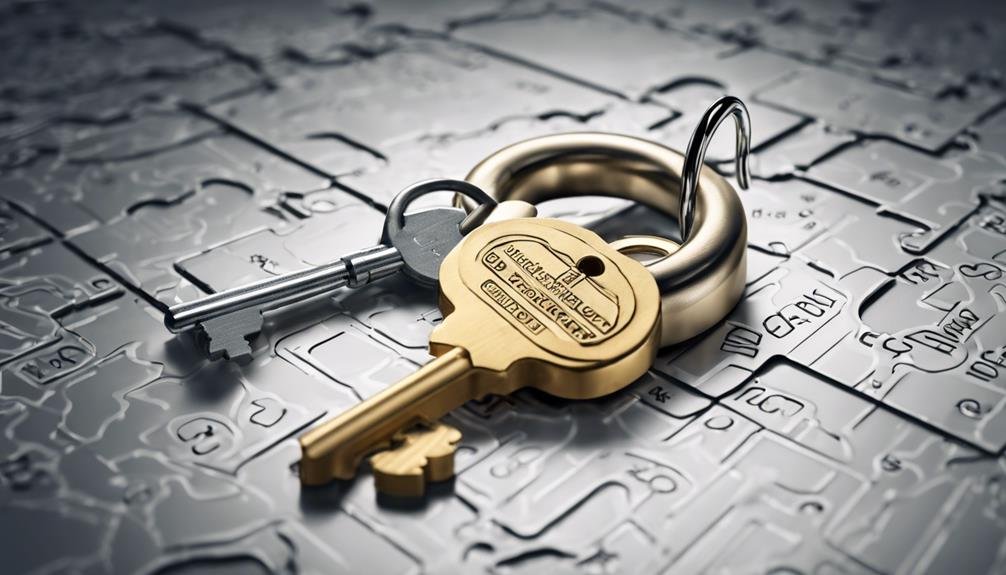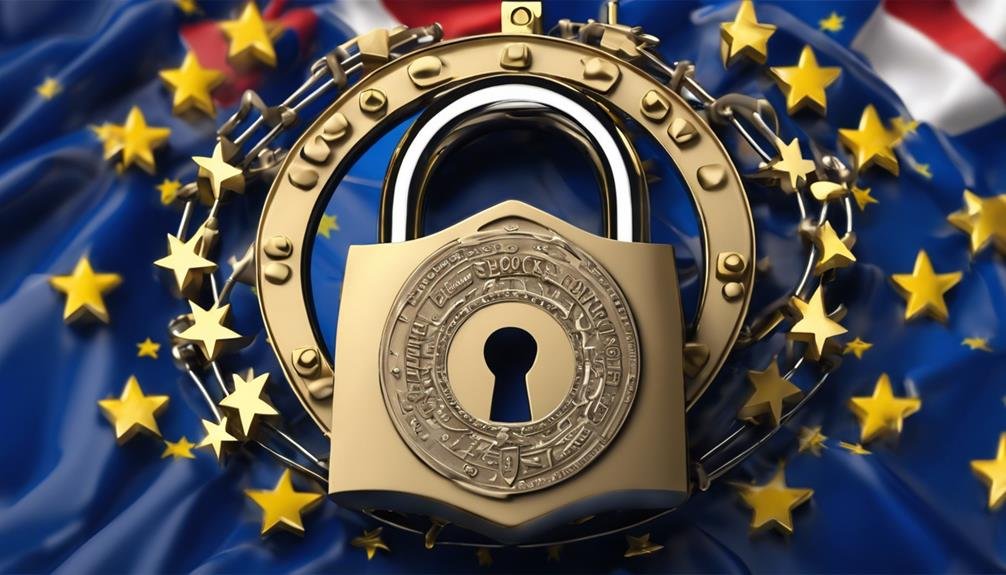To align tokenization with EU regulations:
- Prioritize process transparency and provide detailed token issuance information.
- Obtain clear user consent for data usage and prioritize GDPR compliance.
- Adhere to privacy regulations, conduct Data Protection Impact Assessments, and implement AML and KYC requirements for fraud prevention.
- Guarantee robust security measures like encryption, multi-factor authentication, and regular security audits.
Compliance leads to trust and legitimacy in the digital asset landscape, safeguarding stakeholders and assets. Further insights into aligning tokenization with EU regulations can enhance your understanding of digital asset compliance and trustworthiness.
Table of Contents
Brief Overview of How to Ensure Tokenization Meets EU Regulations
- Prioritize GDPR compliance in tokenization processes.
- Obtain clear user consent for data processing.
- Adhere to AML and KYC requirements for legitimacy.
- Implement robust security measures for asset protection.
- Provide transparent information to enhance investor trust.
Transparency in Tokenization Processes
Ensuring transparency in tokenization processes is not just a regulatory requirement but a crucial step in providing investors with important information and protecting them from fraudulent activities. Transparency involves disclosing detailed details on token issuance, trading, and related services. This includes making white papers for offerings and trading available to investors to guarantee they have access to vital information. By adhering to strict marketing communication rules and guidelines, token issuers contribute to maintaining transparency in their operations, empowering investors with the knowledge they need to make informed decisions.
Transparency requirements in tokenization focus on market integrity, shielding consumers from falling victim to fraudulent schemes. Transparent tokenization processes not only enhance market integrity but also help build trust and credibility, fostering investor confidence and promoting sustainable growth. Investors rely on transparency to make informed decisions and mitigate risks associated with token investments. Hence, transparent practices in tokenization play a crucial role in safeguarding the interests of investors and upholding the market’s integrity, giving them reassurance and confidence in their investments.
User Consent for Data Usage

Obtaining explicit and affirmative user consent for data usage is a pivotal requirement mandated by the GDPR to guarantee the lawful processing of personal data. When it comes to user consent and data usage, there are essential aspects to take into account:
- Companies must obtain clear and affirmative user consent before collecting or processing their data.
- Consent should be freely given, specific, informed, and unambiguous to comply with data protection laws.
- Users have the right to withdraw consent at any time, and companies must make it easy for them to do so.
- Non-compliance with consent requirements can result in significant fines and penalties under GDPR.
Ensuring that users understand how their data will be used and actively agreeing to it is not just a legal requirement but a fundamental aspect of respecting their privacy and rights. Obtaining explicit and affirmative user consent for data usage is a pivotal requirement mandated by the GDPR to guarantee the lawful processing of personal data. Remember, being transparent and respectful of user consent fosters trust and avoids potential legal consequences, making users feel respected and valued.
Adherence to Privacy Regulations

Compliance with GDPR is essential when handling personal data in tokenization processes within the EU. Tokenization platforms must prioritize GDPR compliance to guarantee the protection of personal data. Implementing privacy by design and default principles is vital to safeguard individuals’ information per EU regulations. Individuals must be informed about how their data is processed in tokenization projects, promoting transparency and accountability.
Additionally, tokenization projects involving personal data must conduct Data Protection Impact Assessments (DPIAs) to evaluate and mitigate potential risks to data subjects. Non-compliance with EU privacy regulations can result in significant fines and reputational damage for tokenization projects. Adhering to privacy regulations is a legal requirement and a fundamental step toward maintaining trust with stakeholders and safeguarding data integrity. By prioritizing GDPR compliance and data protection measures, tokenization projects can navigate the complex landscape of privacy regulations while building trust and reliability.
Consideration of AML and KYC Requirements

Considering the necessity of preventing illicit financial activities, tokenization platforms in the EU must prioritize adherence to AML and KYC requirements. These platforms must comply with AML regulations to prevent the misuse of tokenization for illegal financial activities. Similarly, KYC requirements guarantee that identity verification processes are in place, preventing fraud and illicit transactions within the tokenization ecosystem. Failure to meet these standards can lead to severe penalties, fines, or even the shutdown of tokenization services. By implementing robust AML and KYC processes, tokenization platforms enhance trust, transparency, and legitimacy by EU regulations.
- AML regulations prevent illegal financial activities
- KYC requirements verify user identities for fraud prevention
- Compliance with AML and KYC is essential for EU tokenization platforms
- Penalties for non-compliance can include fines or service shutdown
- Enhancing legitimacy through robust AML and KYC processes
Implementation of Robust Security Measures

To enhance the security of tokenized assets and transactions in the EU, robust security measures must be implemented, incorporating encryption, multi-factor authentication, and regular security audits. Implementing these measures is vital to safeguarding financial assets in digital form and ensuring compliance with European regulatory standards. By utilizing secure smart contracts and permissioned access control, the security of tokenized securities can be further fortified, reducing the risk of unauthorized access and fraudulent activities in digital markets.
Compliance with legal and regulatory frameworks, such as GDPR requirements for data protection, is essential when dealing with tokenized assets to effectively align with European regulations. Regularly monitoring cyber threats and vulnerabilities is imperative to mitigate potential risks and uphold the security of tokenized assets and transactions. Engaging cybersecurity experts and staying abreast of evolving security best practices can help organizations navigate the complexities of tokenization while adhering to EU regulations and protecting digital assets in financial markets.
Frequently Asked Questions
How Do You Comply With Mica?
To comply with MiCA, you must implement robust compliance measures, adhere to the regulatory framework, prioritize data protection, fulfill KYC requirements, combat anti-money laundering, address privacy concerns, enhance security measures, guarantee proper token issuance, leverage technology solutions, and consider legal implications.
What Are the Steps in the Tokenization Process?
When tokenizing assets, start with selecting assets, structuring legally, issuing tokens, onboarding investors, and complying with regulations. Smart contracts automate issuance, transfer, and rule compliance. Tokenization aims for liquidity, global access, and fractional ownership.
Which Jurisdiction Is Best for Tokenization?
When considering the best jurisdiction for tokenization, weigh factors like regulatory requirements, legal clarity, and market potential. Countries like the UK offer favorable environments for crypto projects. Choose wisely for successful tokenization.
How Is Tokenization Regulated in the US?
To grasp US regulations on tokenization:
- Guarantee compliance with SEC’s securities laws.
- Consider legal implications, market trends, and technology innovations.
- Prioritize consumer protection, data privacy, and risk management in line with industry standards for token issuance and trading.
Conclusion
In summary, aligning tokenization with EU regulations is vital for ensuring compliance and protecting user data. Businesses can navigate the regulatory landscape effectively by prioritizing transparency, user consent, privacy regulations, AML and KYC requirements, and robust security measures. Remember, compliance is essential to building trust and credibility in the digital economy. So, stay informed, compliant, and ahead of the game. After all, knowledge is power in the world of tokenization.




